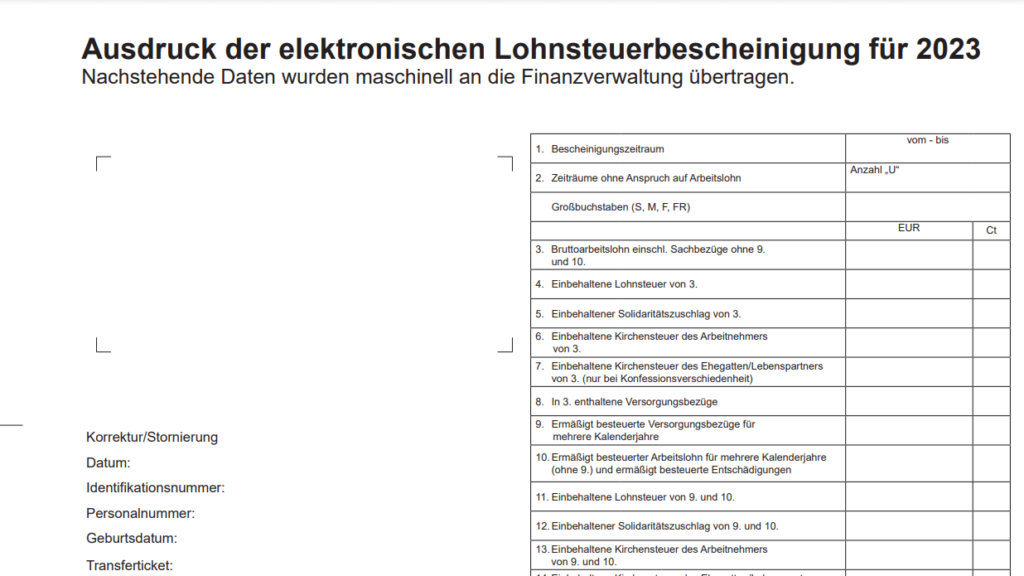Mandatory tax returns dictate specific obligations for certain groups, be it the self-employed or high-earning individuals, requiring their diligent attention to intricate details and legal compliance. On the other hand, voluntary tax returns present an optional yet valuable avenue for individuals to reassess their financial standing, potentially unlock additional deductions, and even secure tax refunds. Both avenues, while distinct in their requirements, hold the power to significantly impact an individual’s tax position, offering opportunities for optimization and potential financial benefits.
1. Mandatory Tax Return in Germany (Pflichtveranlagung)
1.1 What is a Mandatory tax return?
In Germany, a mandatory tax return, or “Pflichtveranlagung,” refers to the obligation imposed on certain individuals to submit an annual tax return. Unlike the voluntary tax return, which individuals choose to file to potentially optimize their tax situation, a mandatory tax return is required by law for specific groups or situations.
1.2 Employees who need to submit mandatory tax return
Germany’s tax system is comprehensive, encompassing various factors that determine who needs to file tax returns and how they are taxed. When it comes to employees, several elements influence their tax obligations. Let’s dive into the intricacies of tax returns in Germany and explore the obligations employees.
- Dual Income: If you have multiple sources of income, it’s essential to declare each, ensuring accurate taxation. Dual income might come from multiple jobs or additional sources like investments.
- Income Tax Reduction (Lohnsteuerermäßigung): This refers to the possibility of reducing your income tax liability, allowing employees to apply for tax reductions, such as deductions for specific expenses like work-related costs, education, or household services.
- Domestic Partners: For unmarried couples or registered partnerships, the option to file taxes jointly is available. This can lead to potential tax benefits, particularly if there’s a significant difference in income between partners.
- Provisions (Vorsorge): Germans contribute to social security systems, which include health, unemployment, nursing care, and pension insurance. Contributions to these provisions are generally mandatory and can impact taxable income.
- Residence Abroad: If you’re a resident in Germany, your worldwide income is typically subject to German taxation. However, double taxation agreements might apply if you’re also earning income abroad.
- Verlustvortrag (Loss Carryforward): If you’ve incurred losses in the past, you can carry these forward to offset against future profits, reducing your taxable income.
- Complex Income Structures: Those with complex income structures, like multiple sources of income, rental income, or income from foreign sources, are often required to file a tax return.
- Certain Marital Situations: Couples under specific marital or partnership circumstances might be required to file a joint tax return, even if one of them doesn’t meet the individual income threshold for mandatory filing.
1.3 Self-Employed Individuals
For self-employed individuals, tax obligations can be more intricate:
- Income Tax: Self-employed individuals are taxed on their profits. They need to keep thorough records of their earnings and expenses to calculate the taxable income accurately.
- Value Added Tax (VAT): Depending on the nature of the business, VAT registration might be necessary. This involves charging and paying VAT on goods and services.
- Business Expenses: Self-employed individuals can deduct legitimate business expenses, reducing their taxable income.
- Quarterly Payments: Unlike employees, who often have taxes withheld from their paychecks, self-employed individuals typically make quarterly estimated tax payments.
Understanding and complying with these requirements is essential to ensure accurate and lawful taxation for both employees and self-employed individuals in Germany. In both cases, seeking advice from tax professionals or using reliable tax software can be beneficial to navigate the complexities of German tax law and optimize tax returns.
Remember, each individual’s situation might differ, so personalized advice is valuable. Germany’s tax system is known for its meticulousness, but with the right knowledge and guidance, navigating tax obligations can become more manageable for both employees and self-employed individuals.
2. Voluntary Tax Returns in Germany (Freiwillige Steuererklärung)
2.1 What is a Voluntary Tax Return?
A voluntary tax return, known as “freiwillige Steuererklärung” in German, is a tax return filed by individuals in Germany when it’s not obligatory or mandated by law. Unlike a mandatory tax return, which certain individuals are required to submit due to their specific circumstances, a voluntary tax return is optional and can be filed by anyone who wants to review and potentially optimize their tax situation.
2.2 Benefits of Voluntary Tax Returns
- Tax Refunds: A compelling advantage of filing a voluntary tax return in Germany is the potential for a tax refund. This typically occurs when the total tax deductions made from an individual’s income exceed their actual tax liability. It’s especially common for those with various deductible expenses, such as work-related costs, education fees, or donations. By thoroughly documenting these expenses and submitting a voluntary tax return, individuals can claim the surplus tax deductions and potentially receive a refund.
- Maximizing Deductions: Voluntary tax returns allow individuals to claim additional deductions and allowances beyond what’s covered in the standard tax deduction process. This provides an opportunity to optimize tax benefits by considering overlooked or previously unknown deductible expenses. It’s an avenue to maximize deductions, including work-related costs, travel expenses, or special deductions for specific professions, ensuring that taxpayers benefit from every legitimate deduction they’re entitled to.
- Optimizing Expenses and Family Benefits: Filing a voluntary tax return enables individuals to declare a wide array of expenses that might not have been considered in the standard filing. This includes expenses for education, professional development, health care, and even charitable contributions. Moreover, for married couples or parents, the option of filing a joint voluntary tax return could result in substantial benefits or tax advantages that aren’t available in the standard filing process. This flexibility provides an opportunity to reassess and optimize the tax situation, maximizing benefits for families and individuals.
Filing a voluntary tax return in Germany offers numerous benefits, from potential tax refunds to optimizing deductions and allowances. It’s an opportunity for individuals to ensure they are not overpaying their taxes and can benefit from additional deductions and potential refunds. While it might seem daunting, the assistance of tax professionals or reliable tax software can streamline the process and maximize the advantages. Understanding the significance of voluntary tax returns empowers individuals to take charge of their finances, ensuring they benefit from all available tax deductions and allowances, ultimately leading to a more efficient and optimized tax situation.
Conclusion
Understanding and leveraging these two distinct yet interconnected avenues are fundamental in the quest for financial optimization and compliance. The mandatory path demands attention to detail and legal adherence, while the voluntary route, though optional, presents a potential catalyst for financial benefits. Both avenues, when navigated with insight and knowledge, hold the power to mold a more advantageous tax position for individuals in Germany.
This guide aims to equip individuals with the necessary tools and insights to make informed decisions regarding their tax returns, whether mandatory or voluntary. By comprehending the obligations, benefits, and strategic pathways each avenue offers, individuals can navigate the intricate German tax terrain with confidence, ensuring both compliance and potential financial gains. In the ever-evolving realm of financial management, a nuanced understanding of mandatory and voluntary tax returns stands as a beacon, guiding individuals towards a more optimized and informed financial future.


